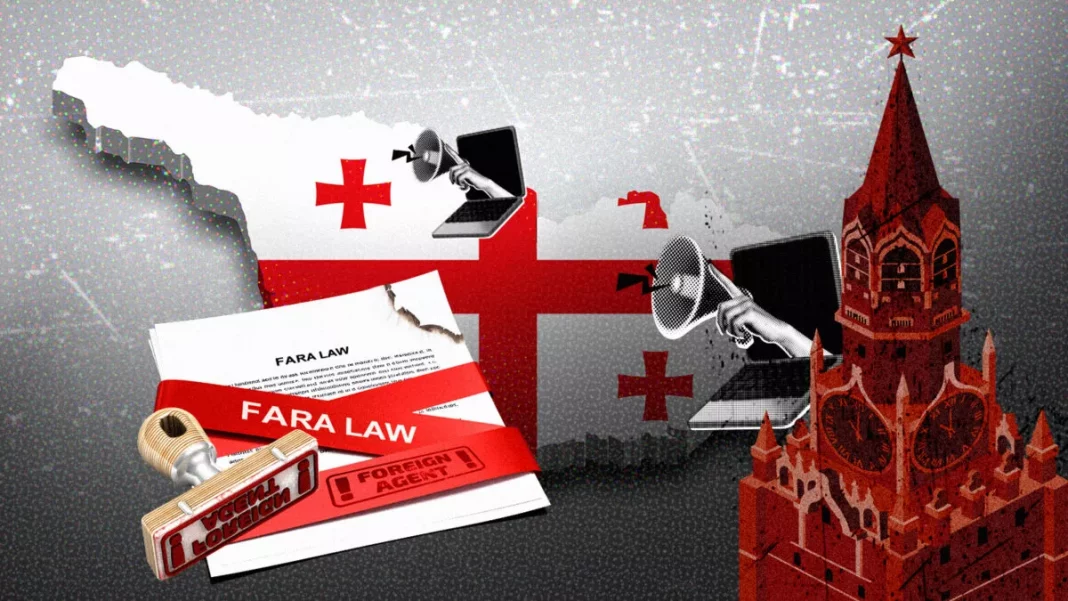By EUvsDisinfo
Georgia’s authorities have started a disinformation campaign ahead of the application of a new Foreign Agents law.
As of 1 June, a new law is expected to be implemented by Georgia’s government: a recently adopted Foreign Agents Registration Act (FARA). To prepare for the law’s application, the authorities have launched a concerted campaign to sway public opinion and convince citizens of the law’s necessity as a step to enhance the country’s sovereignty – a campaign that also includes elements of disinformation and manipulation. Many of these narratives are spread by pro-Kremlin propaganda sources that often support Georgian Dream government’s anti-democratic moves.
The ruling Georgian Dream party tried to introduce Foreign Agents legislation in 2023 but was forced to withdraw after it sparked a wave of massive protests across Georgia. But then, last year, despite major public opposition, it managed to get a Transparency of Foreign Influence law adopted, a rebranding of the 2023 draft law. And to general surprise, earlier in 2025, it also adopted an exact copy of the US Foreign Agents Registration Act (FARA), but without the US legal enforcement practice.
Curbing foreign influence
Ever since the introduction of FARA earlier this year, Georgian Dream officials and their affiliates, along with pro-government propaganda channels, have been actively promoting the legislation by advancing the idea that the previously adopted Transparency of Foreign Influence law did not fully eliminate the problem of covert foreign funding; FARA, they said, will be a guarantee that Georgia’s sovereignty, independence and national interests are firmly protected.
Georgian Dream officials also argued that FARA will be one of the tools used to protect the security of the country and prevent external actors from providing funding aimed at stirring up unrest in Georgia.
While acknowledging that FARA is much stricter than the 2024 legislation, Georgian Dream officials underscored that it would operate in accordance with human rights standards. FARA’s introduction was primarily explained by various messages from Georgian Dream officials arguing that the previously adopted Transparency law had failed to protect Georgia from externally funded organisations that act against the interests of the country, undermining Georgia’s sovereignty and democracy.
The explanatory note of the FARA law, believed to be masterminded by the real leader of Georgian Dream Bidzina Ivanishvili, makes clear that it is intended to target civil society organisations that choose not to register under the so-called Russian-style foreign agent law. Georgian Dream has further justified the need for such legislation by referencing conspiracy theories about a so-called “Global War Party” or “Deep State.”
The US model, FARA way
FARA’s introduction was also sought explained and justified by pointing to the application of exactly the same legislation in the United States. If the legislation is flawed, they said, complaints should be directed at the US. This sleight of hand allowed Georgian Dream leaders to dismiss any potential criticism from foreign politicians and diplomats who, according to Georgian Dream, had tried to undermine the so-called transparency law with conspiracies and disinformation.
Indeed, Georgian Dream was careful to ensure that the Foreign Agents Registration Act introduced and adopted by Parliament was an exact copy of the US legislation, adapted to Georgian legislative reality. In this way, Georgian Dream and its affiliates sought to prevent comparisons with the Russian-style Foreign Agents law that was withdrawn in 2023: after all, no one would want to call the US FARA a ‘Russian law’.
But the devil is in the detail: not a law like in the US
However, more than 100 civic groups and media organisations in Georgia expressed concern that the law would target civil society and independent media, and that the Georgian version of FARA was a repackaged Russian law. They noted that the US law ‘does not oppose the activities of independent NGOs and free media’ whereas the Georgian version targets both. This was actually also acknowledged in the explanatory note of the law itself.
Attacking FARA critics
Georgian Dream officials also criticised those who oppose Georgia’s FARA, with claims that while the US is discussing to tighten FARA, other countries like Georgia are barred from having exactly the same law in effect.
Others underscored that local Georgian NGOs have received a new task from their foreign masters – to smear the Georgian analogue of FARA as a ‘Russian law’. They also suggested that this tactic would fail since this alleged ‘Russian law’ was a direct translation of its US model.
Preventing unrest
Georgian Dream propaganda suggests that opposition to FARA aligns with Western agendas to provoke unrest in Georgia and attempt to change power in the country, positioning Georgian Dream as guardians of peace and stability. Foreign funding, they alleged, was being used to organise a revolution in Georgia, using NGOs to destabilise the country. Some stressed that FARA would render transparent such attempts to stir unrest.
Georgian Dream officials also enlisted ‘revelations’ made by the new US administration about USAID and other agencies and their alleged utilisation of funding as a tool to interfere in other countries, postulating Georgia’s FARA as a defence mechanism for its democracy. While Georgian Dream has drawn comparisons with the US to justify its foreign agent law, it overlooks a key development under the Trump administration: a memo by United States Attorney General Pam Bondi that limited the use of FARA to cases involving activity more closely resembling traditional espionage by foreign governments. The same memo also led to the dismantling of the Foreign Influence Task Force and the Corporate Enforcement Unit within the US Department of Justice’s National Security Division.
NGOs as Foreign Agents
Framing civic groups and independent media as foreign stooges and tools of Western interference has been at the forefront of pro-government propaganda promoting FARA. Ever since the first introduction of the draft law on Foreign Agents in 2023, civil society organisations and critical media have been frequent targets of discreditation, often presented as serving foreign interests to destabilise the country – a framing aimed to erode public trust in civil society. See our articles.
Likewise, FARA’s introduction and passage in Parliament was accompanied by a massive wave of derogatory messages against civic groups, coming from Georgian Dream leadership itself, alongside other propaganda sources. They accused NGOs of interfering in political processes in the country, attempting to organise a revolution using foreign funding, and posing a threat to Georgia’s sovereignty. They also asserted that FARA would ensure that these allegedly provocative NGOs would not be able to avoid transparency of funding in the future.
Pro-Kremlin disinformation in favour of FARA
Over the past couple of years, pro-Kremlin disinformation sources in Georgia have been praising Georgian Dream’s policies, especially those that civil society and Georgia’s foreign partners criticised as anti-democratic and anti-Western.
The adoption of the Georgian analogue of FARA, which is likely to be used to crackdown on dissent, is no exception. These sources positively assessed Georgian Dream’s decision to pass a Georgian FARA, dubbing it a move towards the necessary punishment of all alleged traitors. Pro-Kremlin sources also covered statements from Georgian Dream officials promoting the Georgian FARA, as well as attacking civil society organisations, foreign donors, or diplomatic missions. Russia’s foreign intelligence service also amplified false narratives spread by Georgian Dream regarding foreign-backed and -funded protests in Georgia with a statement falsely claiming the EU had paid 120 euros per protester.
Azerbaijani sources praise Georgia’s FARA adoption
Georgian Dream’s adoption of the Georgian version of FARA caught the attention of some Azerbaijani-based outlets as well. Some praised Tbilisi for beginning to realise that the chaos occurring in Georgia was being led by NGOs dependent on Western funding. Others pushed the idea that Georgia’s Foreign Agents law followed Azerbaijan’s example and that Tbilisi adopted Baku’s effective tool against foreign influence, described as an exemplary response to the Biden administration’s policy of fomenting ‘colour revolutions’.
By EUvsDisinfo





